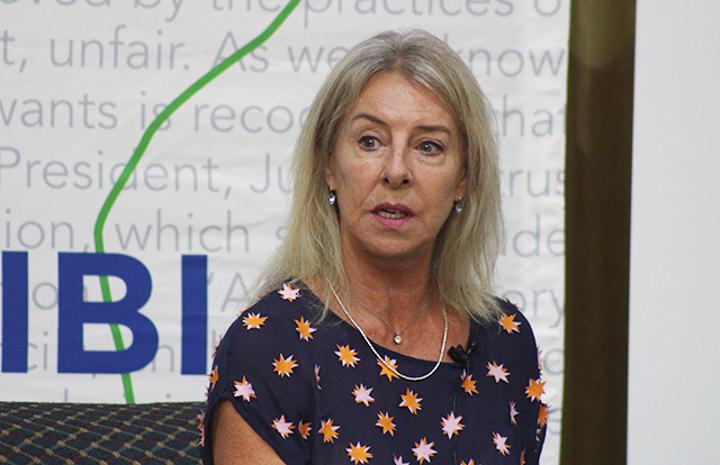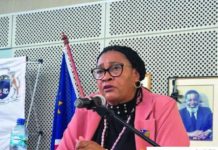Africa-Press – Namibia. TO say Gwen Lister is a respected figure in local media circles would be quite an understatement. She provides a powerful example of fierce determination in how she has carved out a place for herself in history books.
In her recently published memoir, ‘Comrade Editor’, she writes about the various factors that shaped and compelled her to stand up against the apartheid government and fight for the liberation of Namibia.
Led by her moral compass and trusting her gut, Lister has built a legacy as the first female newspaper editor in southern Africa. Through thoughtful personal reflection, Lister walks the reader through some truly exceptional experiences in her life, beginning by describing herself as both a bold and insecure youngster.
Lister grew up in the Eastern Cape and moved around often due to her father’s job as a bank employee. She became aware of the tense political climate in South Africa quite early on, and her social conscience and political awakening regarding the inequalities between black and white were ignited at school, where she was taught by progressive nuns.
She describes a pivotal moment in her early teens, what she calls her ‘Rosa Parks experience’, on a bus in Cape Town. She had offered her seat to an elderly black woman overburdened with parcels in the ‘whites-only’ section, and received a barrage of racial abuse from fellow white passengers.
Lister says the incident made a deep impression. “The hurt in her eyes strikes me like a bolt of lightning. In that instant, my life changed irrevocably . . . I resolved never again to remain silent in the face of injustice,” she says.
After graduating from the University of Cape Town, Lister, reluctant to undergo the typical two-year internship required at most major South African newspapers, set her sights on South West Africa, where her father was stationed at Tsumeb.
When a vacancy cropped up at The Windhoek Advertiser, she applied. A particularly humorous moment in the book is her account of her job interview, conducted by the legendary Hannes ‘Smittie’ Smith, who was already drunk mid-morning, she recalls.
Smittie first berated her as a female journalist and then dragged her off to the pub where he proceeded to get well and truly drunk, she says. Lister got the job.
She was appointed by Jurgen Meinert, the owner of John Meinert Printing and The Windhoek Advertiser, against Smittie’s wishes. He believed women belonged either “barefoot in the kitchen or naked in bed”.
Some very exciting years followed, characterised by finding her own voice and becoming a powerhouse of political journalism. Smittie’s daughter Yanna Smith, who also ventured into journalism, says a large part of ‘Comrade Editor’ describes her childhood.
“I am glad she came forward and captured the essence of my dad. I think he would have liked her honesty and would have expected nothing less,” says Smith.
“In those years my father was a god to me, and he just loved her . . . and combined with how exceptionally pretty and clever she was, she was like a goddess to me. I remember how hard she worked. I wanted to be just like her. In one word, she was accomplished – in everything,” says Smith, who describes Lister as steadfast.
“If she was on a story, one could be assured it would be correct, fair, concise and enduring. Her work ethic and commitment are remarkable. She set the standard for all of us – girls and boys. And her politics are based on humanity and fairness. Unwavering. That is her legacy for me.”
BIRTH OF A NATION ‘Comrade Editor’ tells three stories in one – that of Lister as a woman, the birth of an independent Namibian nation, and the founding of The Namibian.
She provides just enough personal insight to give the reader a rare sense of intimacy, speaking candidly on a number of personal experiences, such as the impact her father’s heavy drinking had on her, as well as the trials she faced with sometimes unsupportive partners.
“Many of those who encouraged me to write the book said they didn’t just want the narrative of what led up to the birth of Namibia, they also wanted insight into Gwen the person,” says Lister.
“That was difficult. Having guarded my privacy very closely for obvious reasons over the years preceding, I now had to dig deep and introspect about myself and my journey. The choices I made as a woman, journalist, activist and editor, and some of the conflicts I dealt with in the process.”
The book was written in fits and starts over the years due to a busy working life. Shining through is the heady excitement of the political build-up to independence, which reignites the sense of exhilaration of the time.
As expected, ‘Comrade Editor’ is politics heavy, going into great detail about important events and figures in the run-up to independence and after. Lister wrote mostly from memory and by going through old newspapers and some of her old diaries which survived the apartheid years.
The manuscript was completed in mid-2020. Lister sent it to a few publishers, who mostly baulked at the length. “Finally, NB Publishers [Tafelberg] showed interest, but also insisted on a fairly brutal edit to more than half of the original,” she says.
This process was challenging due to the complexity of trying to weave together three strands of her personal journey and do justice to all three. After essentially being pushed out of the Windhoek Observer, which she started with Smittie in 1978 after leaving The Windhoek Advertiser, Lister and a few other staff members left the newspaper in protest.
What followed were some tough years, but these only served to strengthen her resolve. More so in the face of her arrest in 1984 under the official secrets and post office acts.
Lister was released a few days later, and soon, with funding from the European Community, she began preparing to launch the first edition of The Namibian.
It hit the streets 36 years ago this week on Friday, 30 August 1985. All 10 000 copies sold out. The founding staff of the newspaper included Rajah Munamava, Chris Shipanga and Dudley Viall, who were part of a team of fewer than 10.
The title ‘Comrade Editor’ actually stems from a nickname given to Lister by Shipanga, who never imagined it would one day be the title of her book. “When the racist and apartheid authorities wanted to literally take the wind out of her sails, she always courageously fought back, and in the process risked her life,” Shipanga says.
“This book is not merely an account on life, journalism and the birth of Namibia, but also a brutally honest story about her personal journey. The author is simply a very rare gem in as far as the Namibian media landscape is concerned, and today, the fruits of her labour are there for all to see.”
With Lister at the helm of The Namibian as editor, she was responsible for managing all aspects of the paper, and had to make important, at the time potentially life-threatening, editorial decisions daily.
In the face of a barrage of death threats, the firebombing of The Namibian’s offices in 1988, and a grenade attack in 1990, Lister remained resolute. She was arrested a second time in 1988, while a few months pregnant with her second child – this time for refusing to name a source.
The book details behind-the-scenes events leading up to Namibia’s independence and sheds light on Lister’s association with the slain liberation activist Anton Lubowski and his assassination just three days before Nujoma’s return to Namibia in September 1989.
The sense of euphoria at the time of independence is palpable in the narration of Namibia’s first free and fair election, and the subsequent withdrawal of the South African Defence Force.
The reader witnesses the swearing in of Namibia’s first president through the eyes of the press stationed on the field of Independence Stadium at midnight on 20 March 1990.
“Setting any pretence of impartiality aside, I joined the crowd in chanting ‘down, down, down’ as the South African flag was lowered until it touched the ground. As the new Namibian flag was hoisted, I wept unashamedly and saw tears on the faces of most reporters and photographers around me too,” Lister recounts.
WOMAN JOURNALIST Journalist Tuyeimo Haidula read the manuscript before publication and offered her observations and the perspective of young Namibians. She describes the book as candid, gracefully written and at times laugh-out-loud funny.
“It reminded me why I started journalism. It rekindled the fire in me to fight against injustice and to reach those furthest left behind.”
The book is dedicated in part to women journalists such as Haidula, who was mentored by Lister to break barriers and take up “space on The Namibian’s front page”.
Gender is still an obstacle for women journalists, says Haidula. This is something Lister pushed to the limits, even being verbally and physically abused in the process.
“She writes compellingly of the intricacies of marriage and family with honesty and the kind of confidence that comes with being a person of integrity who knows who she is and is comfortable with it – and is not willing to be anything less,” says Haidula.
Touching on some important political events, ‘Comrade Editor’ provides historical context to Lister’s life in journalism and the history of the country.
“This is especially to the benefit of readers not familiar with Namibia, but also for many of our young people, who aren’t necessarily that familiar with our past,” says Lister.
“It could never be the whole story on the history of the Namibian struggle, or the complete saga about the birth and growth of The Namibian or our country for that matter.”
Lister stepped down as editor in 2011, taking on a different role in heading up the Namibia Media Trust, which advocates media freedom, free expression and access to information.
Far from showing any signs of slowing down, she continues to remain relevant in the field and is very active on Twitter, where she has been known to share her “opinions for Africa”.
“I still believe in a future for print,” she says.
“But it will be different from the heyday of the newspaper when entire editions sold out before the onset of the digital era.”






